
In today’s rapidly evolving world of global trade, the logistics and shipping industry faces unprecedented pressure to deliver not just efficiency and reliability, but also sustainability. As more businesses and consumers demand eco-friendly practices, the focus on sustainable cargo transport and green solutions in international freight and logistics has never been greater. This shift is transforming how logistics companies, freight forwarders, and shipping services operate, setting new standards for the future of international shipping services.
The world’s supply chains are powered by cargo shipping, freight transport, and logistics delivery. However, the environmental cost of moving goods across continents is substantial. Fossil fuel consumption, packaging waste, and inefficient routing contribute to pollution and climate change. As a result, logistics providers and logistics solutions companies are prioritizing green logistics and sustainable logistics practices to reduce their carbon footprint and build a more resilient future.
The adoption of alternative fuels and electric vehicles is a major step forward in sustainable logistics. Today, freight shipping companies are investing in LNG, biofuels, and even hydrogen-powered trucks to reduce emissions. The rise of electric delivery vans and hybrid vehicles is making last mile delivery and door-to-door delivery more sustainable and efficient, especially in urban environments.
Route optimization and fleet management are at the heart of green logistics. Advanced tracking logistics and real-time tracking technologies, powered by AI and IoT, allow logistics companies to select the most efficient routes, avoid congestion, and minimize fuel consumption. Tracking shipping and tracking delivery platforms provide end-to-end visibility, ensuring shipments are delivered on time and with minimal environmental impact.
Warehousing solutions and fulfillment services are embracing biodegradable packaging, recyclable materials, and minimalist designs to reduce waste. Inventory management and warehouse logistics systems help minimize overstocking and optimize storage, further enhancing sustainable supply chain practices. By reducing excess packaging and improving storage efficiency, logistics companies are making significant strides toward sustainability.
Many logistics shipping providers now offer carbon offset programs, allowing customers to neutralize the environmental impact of their shipments. By investing in reforestation, renewable energy, or clean water projects, businesses and individuals can make their international courier service and cargo shipping activities more sustainable.
Green certifications, such as ISO 14001 or LEED, signal a commitment to environmental stewardship and can enhance a company’s reputation in the global logistics market.
Many international delivery services now offer carbon-neutral shipping options, allowing businesses and customers to offset emissions by investing in reforestation, renewable energy, or clean water projects. Green certifications such as ISO 14001 and LEED are becoming standard among leading logistics service providers, signaling a commitment to environmental stewardship and responsible business practices.
Collaboration is also key. Circular supply chains-where materials are reused, recycled, or repurposed-are gaining traction. Reverse logistics and returns management systems enable products and packaging to be collected and reintroduced into the supply chain, reducing landfill waste. Shippers, carriers, and logistics partners are working together to build resilient, sustainable networks.
Digital freight forwarding, blockchain logistics, and IoT-enabled fleet management are revolutionizing the industry. Logistics software and transport management systems streamline operations, making it easier to implement and monitor sustainability initiatives. Predictive logistics powered by AI and big data analytics enables companies to anticipate demand, optimize routes, and allocate resources more efficiently.
Cloud logistics platforms provide real-time access to shipment data, supporting shipment tracking, delivery tracking, and order fulfillment. Smart logistics solutions, such as autonomous delivery vehicles and drone delivery, are on the horizon, promising to further reduce emissions and improve efficiency.
Today’s customers expect fast shipping services, affordable shipping rates, and transparent delivery tracking, all while demanding eco-friendly logistics. Companies that offer real-time shipment tracking, live shipping calculators, and green shipping options stand out in a crowded market. Customer service logistics teams play a crucial role in educating customers about sustainable choices and providing support throughout the shipping process.
Pricing for shipping is also evolving. Dynamic pricing, shipping calculators, and freight quotes now factor in eco-friendly options, allowing customers to choose greener alternatives at checkout. Transparent logistics pricing builds trust and encourages more sustainable choices.
Different industries face unique sustainability challenges. Automotive logistics, pharma logistics, retail logistics, and food logistics all require tailored green solutions. Cold chain logistics must balance temperature control with energy efficiency, while perishable logistics focus on reducing spoilage and waste.
Regional solutions are also important. Logistics companies in India, the USA, and Dubai are developing strategies to address local regulations and market demands. Cross border logistics and import export logistics require careful planning to ensure compliance and minimize environmental impact.
Sustainable logistics services offer more than just environmental benefits. By optimizing routes, reducing waste, and embracing technology, companies can lower operational costs and improve efficiency. Transparent reporting on sustainability metrics, such as emissions reductions and waste diversion, builds trust and differentiates brands in the global logistics market.
Logistics companies that prioritize sustainability are more attractive to environmentally conscious consumers and business partners. As regulations tighten and customer expectations rise, green logistics is becoming a fundamental requirement for success.
The future of sustainable international freight will be shaped by continued innovation and collaboration. Key trends include:
Autonomous Electric Vehicles: Self-driving trucks and drones powered by renewable energy will revolutionize last-mile delivery and cargo transport.
Blockchain for Supply Chain Transparency: Immutable records of environmental performance will enable greater accountability and trust.
Regulatory Evolution: Governments will continue to tighten emissions standards and incentivize green logistics practices.
Customer-Driven Demand: As more customers demand sustainable shipping options, logistics and services providers will need to adapt or risk losing market share.
Sustainable cargo transport is no longer optional-it’s a strategic imperative for businesses engaged in global logistics. By embracing green solutions, from alternative fuels and smart routing to eco-friendly packaging and carbon offsetting, the industry can reduce its environmental impact while delivering efficient, reliable service cargo worldwide. As innovation accelerates, sustainable logistics will become the standard, ensuring a cleaner, greener future for international shipping services and global trade.